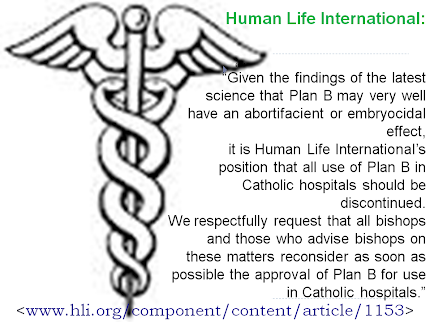Diocese of Trenton
701 Lawrenceville Road
Lawrenceville, NJ 08648
Your Excellency:
We often hear that there have been 50 million abortions in the United States, since the 1973 Roe v. Wade Supreme Court decision. Yet when you properly include abortions from chemical and mechanical methods in that count, Pharmacists for Life International (PFLI) more accurately place that number at 308,000,000!
Most of the world's "leading manufacturers" of "the Pill" are based in the U.S., and most of those are based in Jersey - as well as two in the nearby Philly suburbs:
- G.D. Searle / Pharmacia of North Peapack, NJ
- Gynétics of Lawrenceville, NJ (just six miles up the road from your chancery)
- Janssen of Titusville (just 11.1 miles from your chancery)
- Merck of Whitehouse Station, NJ
- Ortho-McNeill of Raritan, NJ
- Pfizer of Morris Plains, NJ
- Warner-Chilcott of Rockaway, NJ
- Women's Capital Corporation (actually the "Plan B" division of Teva of North Wales, Pa)
- Wyeth of St. Davids, Pa. (See http://contraceptive.ippf.org/search?search.searchtext=&search.countrycode=US and http://www.thepill.com/aboutortho-get.).
While we now know "How 'the Pill' Works as an Abortifacient," only a handful of pharmacies in the entire United States REFUSE to carry such poisonous hormonal "contraceptives" (See http://www.pfli.org/main.php?pfli=findpharmacist.). In fact, MOST pharmacies (including those in supermarkets and department stores) carry the notorious Plan B:
- "A federal court judge has ordered the U.S. Food and Drug Administration to lift controversial restrictions on the so-called morning-after pill, saying females of all ages should have unimpeded access to emergency birth control....U.S. District Court Judge Edward Korman directed the FDA to make levonorgestrel-based contraceptives available over the counter, and without a prescription. The ruling overturns a 2011 decision by Health and Human Services Secretary Kathleen Sebelius requiring that girls under age 17 obtain a prescription for the Plan B One-Step contraceptive or its equivalents....Korman ordered that the drugs be made available without limits within 30 days" (Los Angeles Times, 4/5/13).
According to its manufacturer, you can "Enter your zip code...to see which pharmacies in your area may carry Plan B One-Step®." Entering all Trenton zip codes, here's what I found:
- ACME PHARMACY (260 DUNNS MILL RD)
- ACME SAV-ON (multiple locations)
- ALEXANDER'S TWIN PHARMACY
- ALLENTOWN
- BENECARD SERVICES
- BOYD'S (multiple locations)
- BRIARWOOD
- BRUNSWICK PHARMACY
- BURNS (MORRISVILLE, PA)
- CAGAN'S
- CVS (multiple locations)
- EPISCOPO'S (multiple locations)
- EXPRESS PHARMACY
- FAMILY PHARMACY LLC
- HAMILTON DRUGS & SURGICALS
- HAMILTON PHARMACY
- HEALTH CARE PHARMACY
- HERITAGE
- HIGHTSTOWN
- KING BOULEVARD
- KMART
- L C BOYD
- MAST PHARMACY & SURGICAL SUPL
- McGRATH
- MEDICAL HOME PHARMACY
- MERCER PHARMACY
- MONUMENT PHARMACY
- OLDEN PHARMACY
- OMNICARE
- PHARMCARE USA
- PLUMSTEAD
- QUAKERBRIDGE PHARMACY
- QUICK CHEK (1535 PENNINGTON RD)
- QUICK STOP FOOD STORE
- RISOLDI'S
- RITE AID (multiple locations)
- ROBBINS
- SHOP RITE (multiple locations)
- SIEGEL'S
- SUPER FRESH
- THRIFTY DRUG
- VILLAGE PHARMACY
- VIZZONI'S
- WALMART (multiple locations)
- WEST TRENTON
What on Earth Were They Thinking?
Close to where I grew up is the Bascilica of Regina Pacis: "THE CENTRAL MURAL on the ceiling shows the Coronation of Our Lady Regina Pacis in heaven. It is a huge, stupendous creation, 60 by 27 feet, by the distinguished artist Ignacio La Russa. In the lower part we see the Holy Father Pope Pius XII symbolically blessing the SHRINE OF PEACE in the presence of Prelates and a large congregation that looks up ecstatically at the Coronation of the Blessed Virgin" (from the web site of Regina Pacis).According to Wikepedia, Joe Profaci was "the founder of what is today known as the Colombo crime family....By 1930, Profaci was controlling numbers, prostitution, loansharking, and narcotics trafficking in Brooklyn....[He also] made generous cash donations to Catholic charities." When the late pastor "presented the church [Regina Pacis] to the Pope, he revealed a Michelangelo-style painting on the ceiling. It featured a crowd of the faithful. Most of them were faceless, but there was a clear likeness of Joe Profaci" (Olives: the Life and Lore of a Noble Fruit, p. 139).
As was the case decades ago, there are continued attempts to gain respectability through donations of ill-gotten gain to the Church. How amazing it is that these people are NOT looking for anonymity! In my opinion, parish bulletins should not be carrying ads for providers of contraceptives - no less for providers of abortifacients. Especially in light of recent developments with Plan B, please consider adopting a policy of refusing pharmacy ads in the parish bulletins of your diocese.
Sincerely,




























